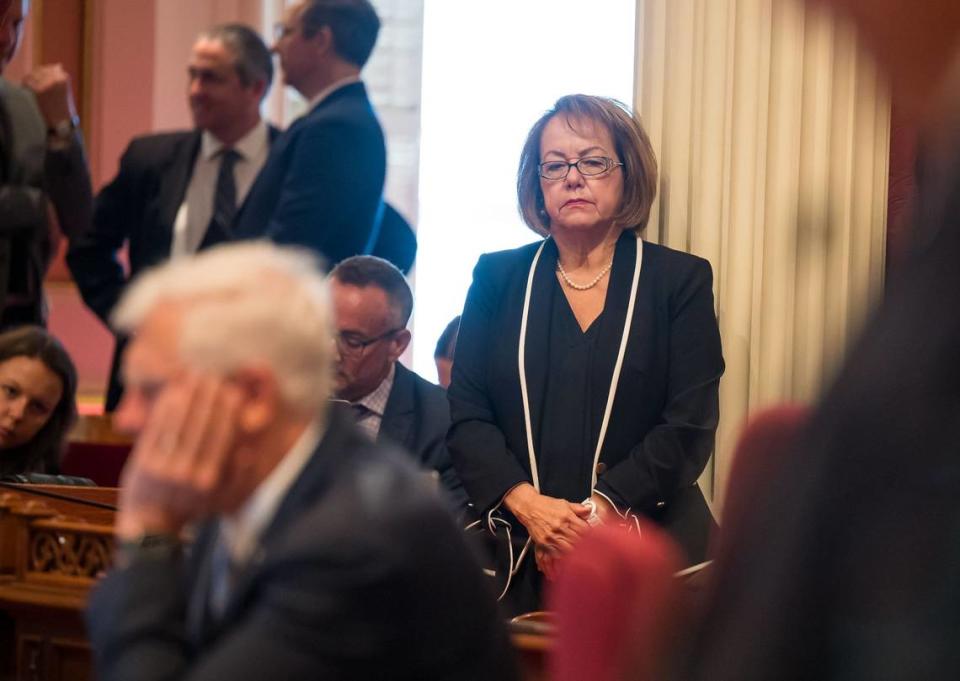California lawmakers strike landlord deal to cap security deposits, add eviction protections
- Oops!Something went wrong.Please try again later.
- Oops!Something went wrong.Please try again later.
California lawmakers brokered deals with landlords and Realtors to send Gov. Gavin Newsom bills to enhance protections for tenants — a victory for renters, in spite of some significant concessions.
The Legislature late Thursday approved Senate Bill 567 from Sen. Maria Elena Durazo, D-Los Angeles, which would strengthen protections for renters facing evictions for renovations or landlord move-ins. Durazo pitched the measure as a way to prevent homelessness for those at risk of losing their housing.
The California Apartment Association and real estate groups strongly opposed SB 567, which builds on a 2019 measure that created a framework of eviction protections for tenants. But Durazo and tenant advocates were able to work out a last-minute deal with the apartments’ group that shifted their stance to neutral.
Lawmakers earlier in the week approved Assembly Bill 12 from Assemblyman Matt Haney, D-San Francisco, which would cap security deposits at one month’s rent. Haney also amended his bill to allow smaller landlords to ask for up to two months’ rent.
Closing eviction loopholes
California renters have traditionally had little power in the Capitol, where groups representing Realtors and landlords hold significant sway.
But tenant advocates and former Assemblyman David Chiu, D-San Francisco, in 2019 were able to hammer out a deal with real estate interests over Assembly Bill 1482.
That bill required landlords to provide a “just cause” for evicting tenants if they terminate a lease for reasons that are not the renters’ fault.
Under AB 1482, landlords are legally allowed to remove tenants through “no fault” evictions if they plan to renovate their rentals, move themselves or family members into units or take properties off the market entirely.
AB 1482 also capped rent increases at 5% plus the inflation rate, with a maximum of 10%.
Durazo authored SB 567 this year in response to tenant advocates’ concerns that landlords were exploiting loopholes in AB 1482 to evict tenants and get around the 10% rent cap. They claim some landlords were removing tenants to complete renovations or move into units, only to later put the rentals back on the market at higher prices.
Her bill originally would have lowered the rent hike cap to 5%, and tightened the rules around no-fault evictions.
Landlords would have been required to allow tenants to return to their units after renovations. They could only ask tenants to move out if the fixes were related to health and safety, and landlords needed 60 days to complete them.
Property owners who moved themselves or family members into units would have needed to occupy the rentals within 90 days and live there for at least three years. Landlords taking rental properties off the market would not have been allowed to rent them out again for at least 10 years.
Protections get watered down
Durazo faced an uphill battle to pass SB 567, and she had to acquiesce to some significant amendments.
The Senate Judiciary Committee stripped the rent cap out of the bill. Additional changes removed the health and safety requirement for repairs and lowered the renovation time period to 30 days. Renters would only have a right to return if landlords don’t make promised repairs.
Landlords moving themselves or family members into rentals must live in units for one year. Those removing properties from the market no longer have to wait 10 years to rent them.
Durazo also had to remove sections preventing no-fault evictions for some tenants who are older than 60, disabled or terminally ill. She originally wanted eviction protections to kick in immediately, but they now apply after one year of tenancy.
The bill, however, retained a significant provision that allows cities and tenants to sue landlords who illegally evict tenants or hike rents.
The apartment association initially viewed SB 567 as a betrayal of the agreement Realtors and landlords reached with tenant advocates four years ago.
“To come here now and claim 1482 needs amendments, more extreme eviction protections, is not backed by data,” said Debra Carlton of the association in April. “It breaches the legislative agreement that we reached in good faith on a historic law.”
But housing interests went neutral on the bill after Durazo and advocates negotiated amendments Monday night. The changes delayed the bill implementation until April and specified an “owner” as anyone who possesses 25% or more of a unit.
Security deposit cap
Haney took amendments carving out a provision for mom-and-pop landlords to push his security deposit cap over the finish line. He also delayed AB 12’s implementation until July.
Landlords who own up to two properties with a total of four units can ask for two months’ rent as a security deposit, while those with more units are limited to one month.
Haney said he carried the amendments to appease legislative colleagues.
“I understand that if it’s your one home that you rent, the level of risk that you’re taking on is different,” he said. “This will apply mainly to larger landlords who own dozens of units, or even thousands of units, who absolutely can charge one month of security deposit and be able to manage the risk.”
Haney last year helped found the California Renters Caucus, which has just five members: himself, Los Angeles Assemblyman Isaac Bryan, San Jose Assemblyman Alex Lee, Encintas Assemblywoman Tasha Boerner and Hayward Sen. Aisha Wahab. The lawmakers formed the caucus to help push legislation to benefit renters.
“Tenant bills are very tough in the Legislature,” he said. “Renters represent less than 5% of the state Legislature. We don’t have a powerful, organized, well-financed lobby. It takes a bill like this that truly resonates widely and broadly and is common sense to be able to get through.”
SB 567 and AB 12 now head to Gov. Gavin Newsom, who must sign or veto bills by Oct. 14.


